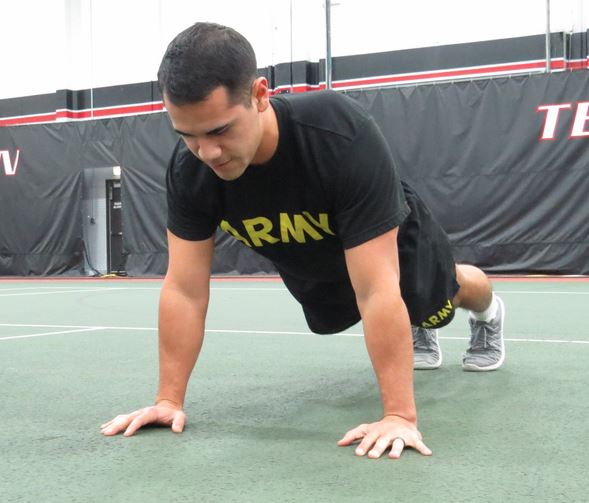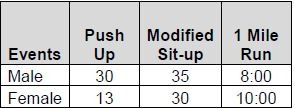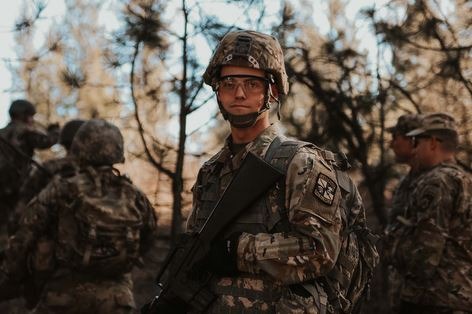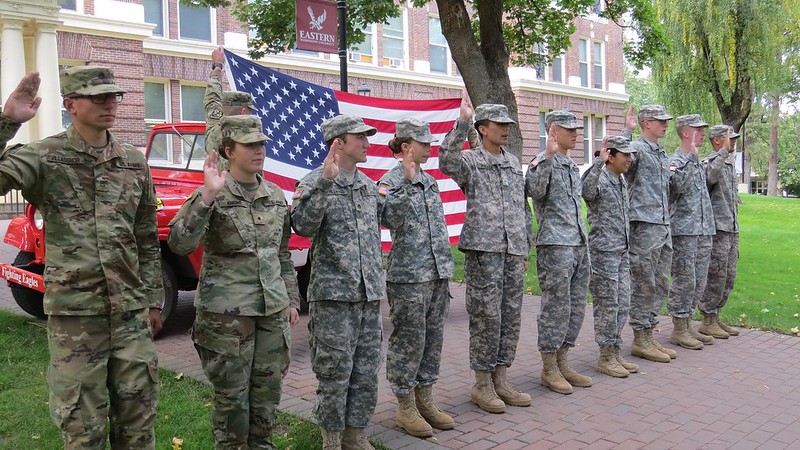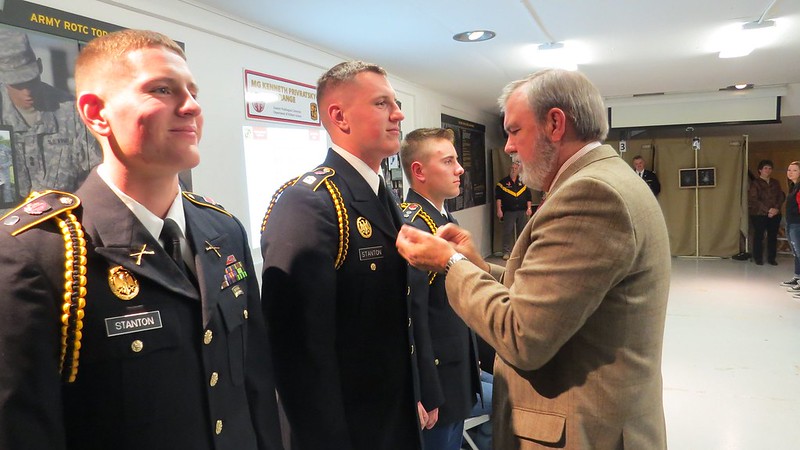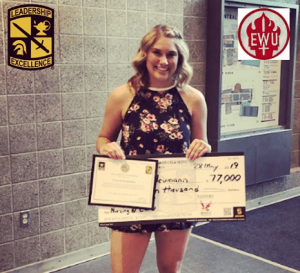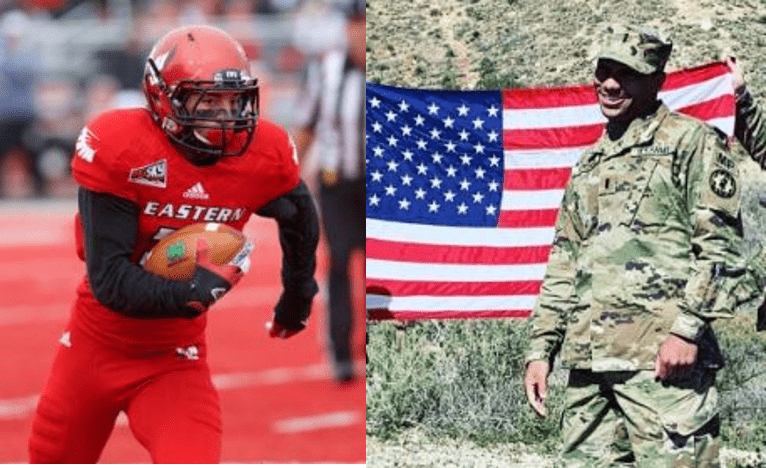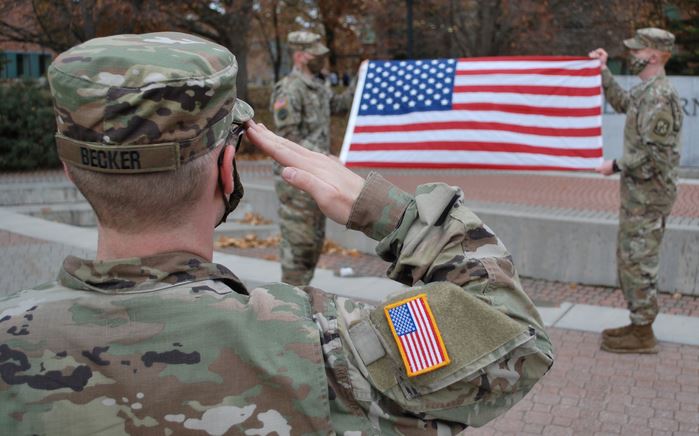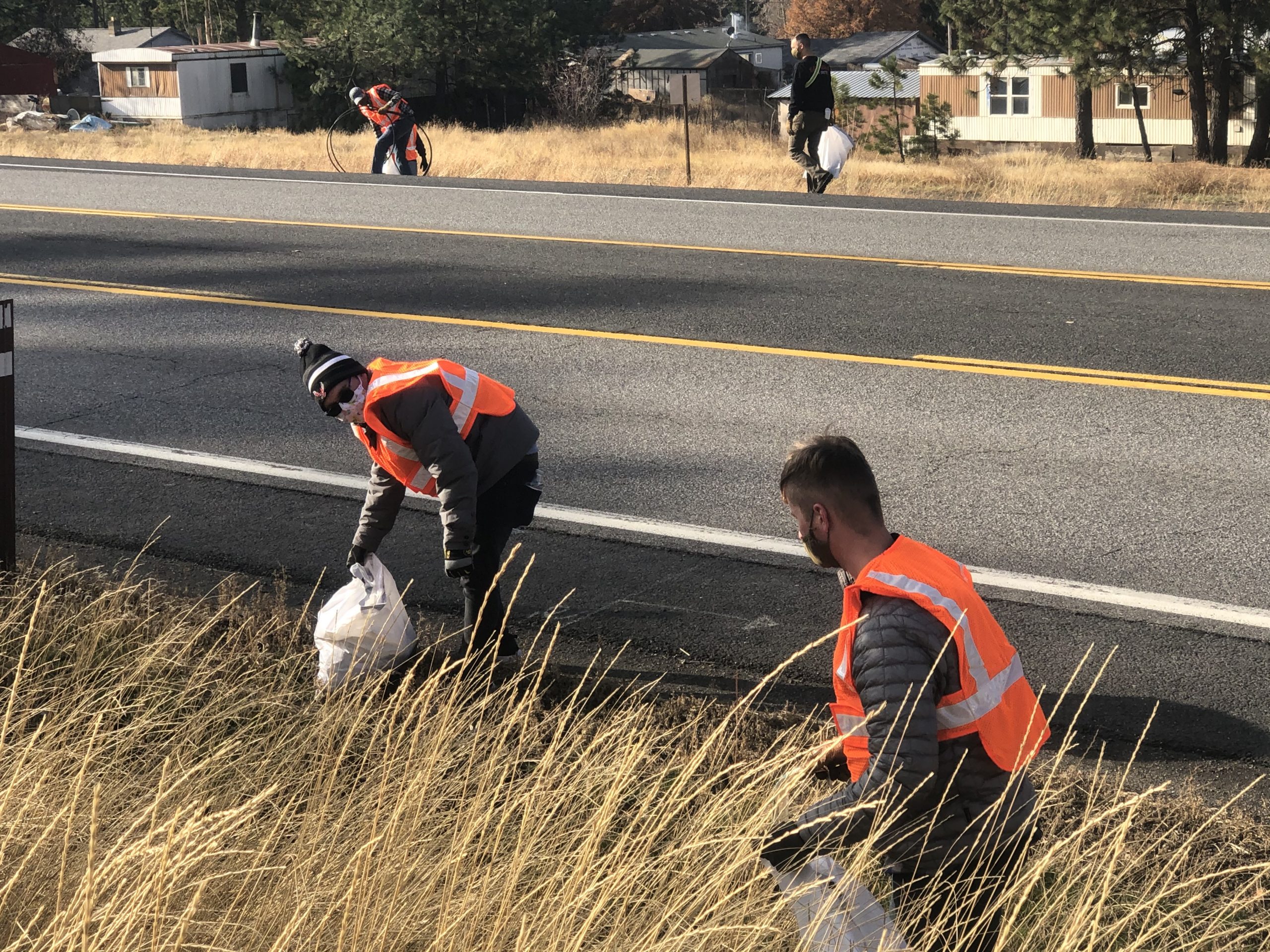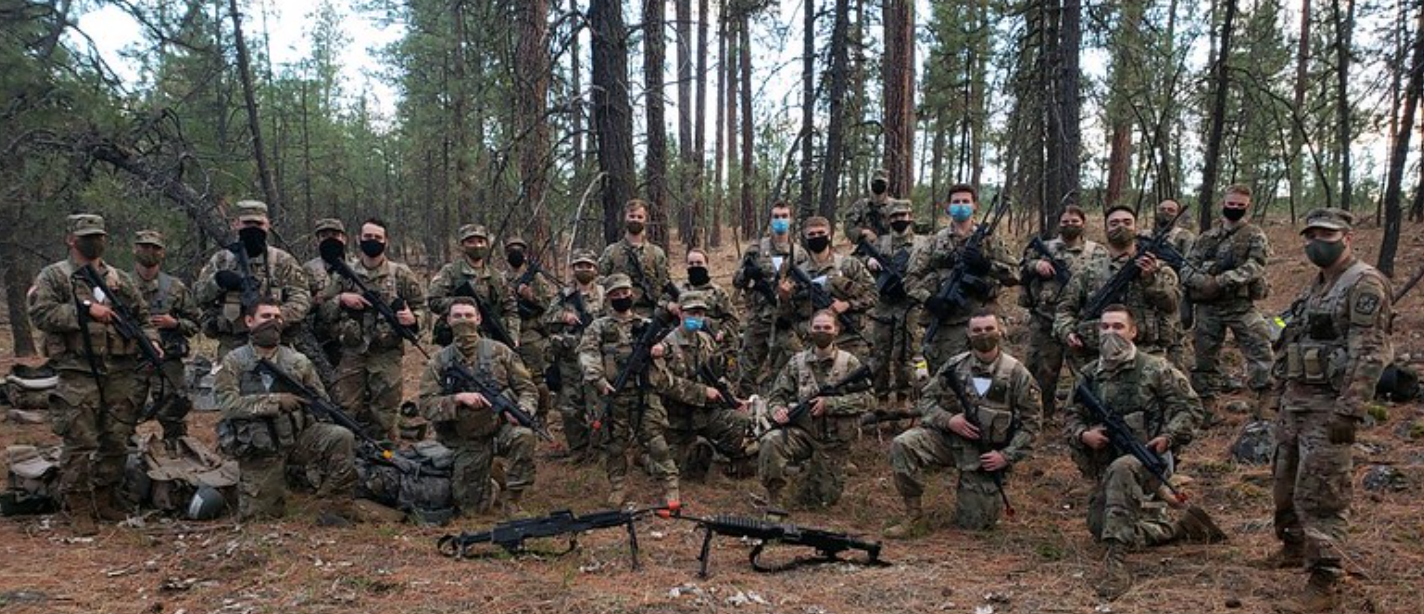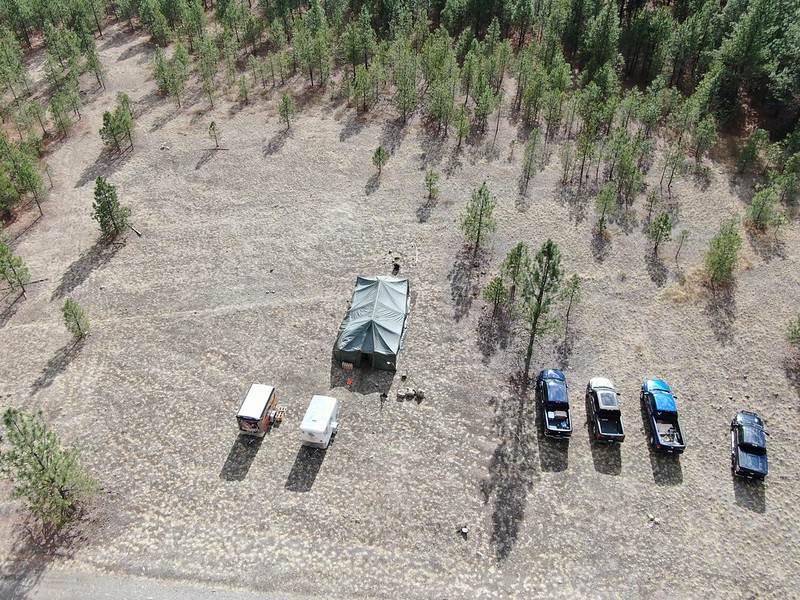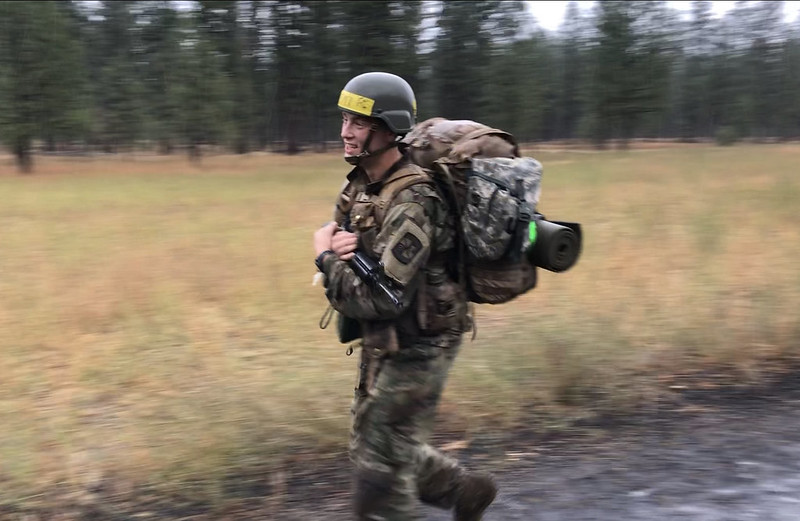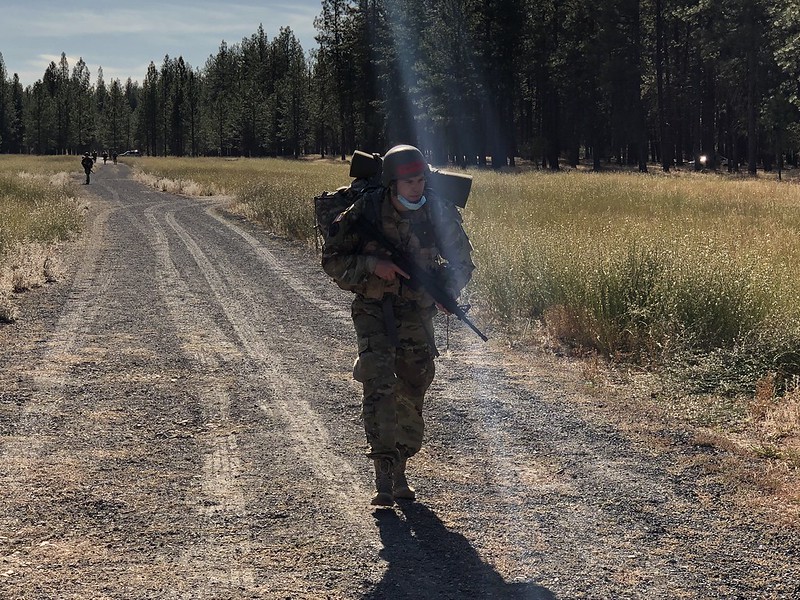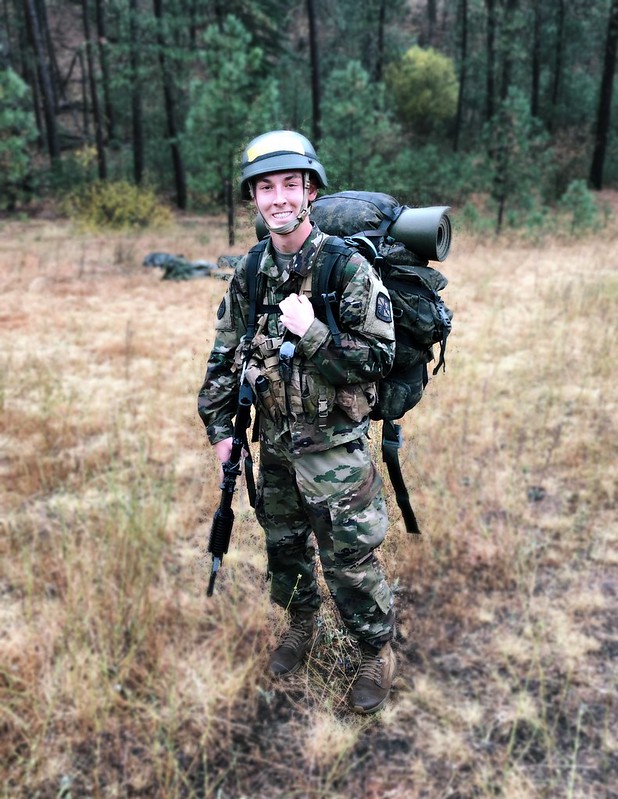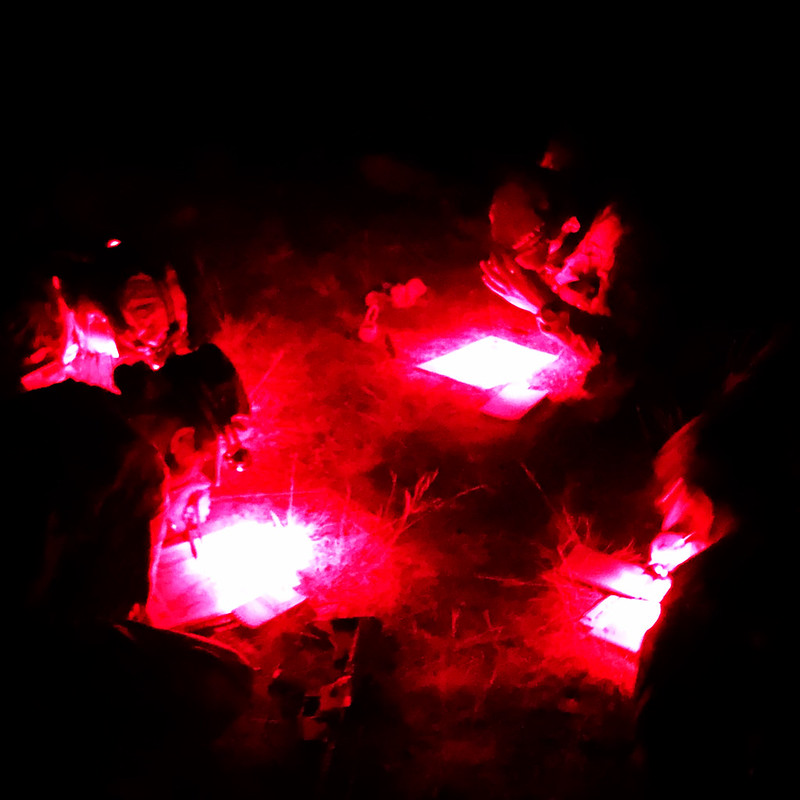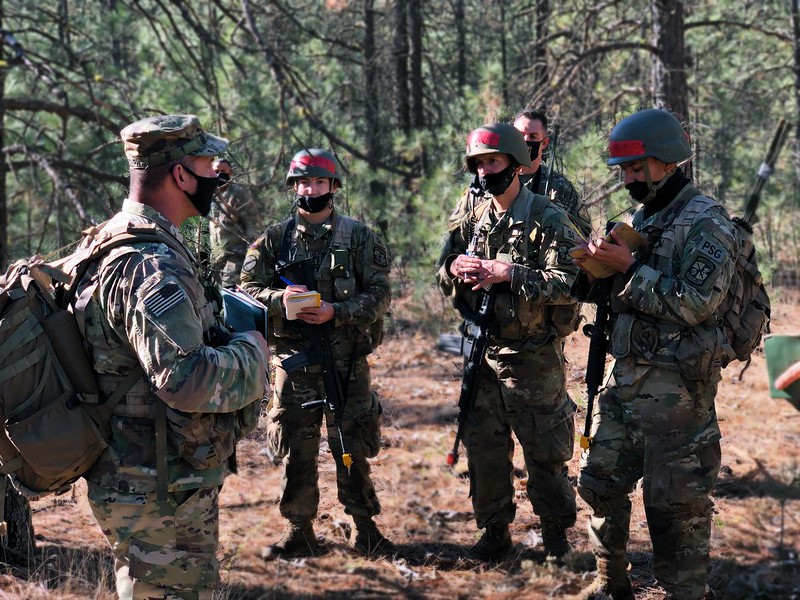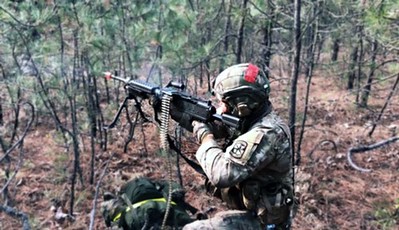2021 Army Internship Application Process
For Cadets interested in conducting internships during Summer 2021, the sign up period has now opened. Any contracted Cadet can apply for an internship. Being able to apply for these incredible internship positions is another benefit of contracting into the ROTC program. I highly recommend that all contracted Cadets consider applying for what is likely a once in a lifetime opportunity. Most of the internships are usually 3-4 weeks in length and Cadet Command will cover the costs of travel, food, and lodging.

Application Process
- Applicants will be placed on the Internship OML only after the completed application is received and if all prerequisites are met at the time of application.
- Subsequent participation in an Internship is contingent upon successful completion of Advanced Camp (AC).
- Priority of assignments.
- Unless otherwise specified:
- MSL III attending AC have priority.
- MSIV Cadets with at least one semester remaining following completion of the Internship.
- SMP Cadets require a memorandum from their assigned unit authorizing exception to be placed in any Internship program to avoid any conflict with his or her unit obligations/commitments.
All Applicants Must:
- Receive approval from their PMS approving Cadet for participation in an Internship.
- Have a valid accessible email account loaded in CCIMM (other than army.mil).
- Meet and maintain a passing Army Physical Fitness Test (APFT) score and passing height/weight standard both at the time of application and throughout any Internship participation.
- Meet all Internship specific requirements (i.e. degree pursuit, clearance level).
-
Submit completed application to the EWU Army ROTC HRA by the deadline of: 24 NOV 20.
Required Documents:
- Internship complete application (FY 19 Version); any letters of recommendation; and supporting documentation.
- Letters of Recommendation.
- Transcripts.
- SMP Memo for Internship participation (if required)
Summary of Process:
- Cadet:
- Request approval from the PMS to submit an application for an Internship.
- Complete and save the application electronically and provide it via email to the PMS or his/her designee prior to the application deadline.
- Obtain letters of recommendation (LOR) from your MSL instructor, PMS, and advisor. Attaching an emailed LOR to your application is acceptable as long as the attachment clearly shows the name of the recommender in the email address and all contact information is contained.
- Submit transcripts along with your application. (unofficial transcripts are acceptable).
- Submit completed application and supporting information to the PMS for review and submission.
List of Internships
Advanced Cyber Education Internships (ACE)
The objective of the Advanced Cyber Education (ACE) Summer Program is to develop the next generation of cyber-security leaders through an intense program that immerses ROTC students in the cyber-security discipline while educating them on becoming future military leaders. The underlying philosophy of ACE is to provide the cadets cyber-security principles through intense coursework and lab-based experiences completed at the Air Force Institute of Technology’s (AFIT) cyber research facilities. The ACE program is a four week course that takes place during the undergraduate academic summer break. This program covers a wide variety of cyber-security related disciplines to develop original thinkers and technical leaders who can solve real-world problems in the area of cyber-security. The program encompasses a multiple of disciplines to include the following:
- Information Operations
- Formal Security Concepts
- Computer Network Defense
- Cyber Attack
- Digital Forensics
- Reverse Software Engineering
- Cryptography
Locations:
Cadets in the ACE program will serve at Wright-Patterson Air Force Base, Ohio.
Prerequisites:
- Undergraduate degree of study in Computer Science, Computer Engineering or Electrical Engineering. Students with a major in a different technical discipline who have a strong computer background are also eligible.
- GPA 2.7 or better in academic major and must have completed their third year of college.
- MS III Cadets have priority. However, MS IV Cadets graduating December or later may apply as an exception to policy.
- Have obtained a government ID such as a CAC by the start date of the program.
Army Cyber Institute (ACI)
The objective of the Army Cyber Institute (ACI) Summer Internship Program (SIP) is to provide the next generation of cyber leaders an opportunity to learn about the research process as it applies to the cyber domain as well as to allow cadets to provide meaningful contributions to real-world research efforts in cyberspace. The ACI’s SIP program is a multi-week course in which cadets participate in a list of ongoing research projects either being actively researching in the Army Cyber Institute, one of the Academic Departments at West Point, or an ACI Industry Partner. The cadet works with a Principal Investigator (PI) who walks them through the research process and helps to scope work that can be completed by the cadet during the duration of the program. This program covers research in a wide variety of cyber-related disciplines with the intent of developing critical thinkers and technical leaders who can solve real-world problems. These cadets are also provided an opportunity to join the Army’s Cyber Leader Development Program (CLDP) which will allow them to obtain a Cyber Leader Additional Skill Identifier (ASI) once commissioned, which will be annotated in the cadet’s official military records upon commissioning. The ACI SIP covers a variety of disciplines including but not limited to:
- Law & Policy
- Electromagnetic Spectrum
- Data Mining
- Artificial Intelligence and Machine Learning
- Virtual and Augmented Reality
- Internet of Things Security
- Cyber Attack and Cyber Defense
- Reverse Engineering and Malware Analysis
- Cryptography and Computational Theory
- Computer Network Design for Resiliency
Location:
Cadets will participate from the United States Military Academy, West Point NY. Depending on classification and type of research available, cadets may also participate from Air Force Research Labs in Rome NY, the National Capital Region or other select locations with Industry Partners as availability and skill sets permit.
Prerequisites:
- Undergraduate degree of study in all disciplines with priority given to STEM.
- GPA 2.7 or better in academic major and must have completed their second year of college.
- Meet current APFT and height/weight standards at the time of application and during attendance.
- MS II or greater cadets.
Cyber Leaders Conference (CLC)
Cyber focused Cadets selected for this two day conference will have priority for ACI Summer Internship at West Point, and other Cyber Internship opportunities. Cadets wishing to participate should select three other Summer Internships. Priority is MSIII and MSIV Cadets. 40 slots available.
The objective of the Class of 1970 West Point Cyber Junior Leader Conference (CJLC) is to bring together junior cyber leaders (O1-O3, WO1-WO2, E5-E6) and cadets to inspire the next generation of leaders in cyberspace operations. Junior Officers, Warrant Officer, and NCOs from across the Cyber Branch and cadets accessing into Cyber from USMA, Army ROTC, and other service academies will meet at the U.S. Military Academy at West Point to discuss leadership in the cyber domain and the unique challenges faced leading cyberspace operations. This conference will provide a unique opportunity to allow the current junior leaders of the Cyber Branch to directly interact with and mentor the cadets reporting to their units in 6-12 months. Additionally, this will be an excellent opportunity for cadets to meet members of the Cyber Warrant Officer and Non-Commissioned Officer communities that are critical to the success of the Cyber Branch. Over the course of the conference attendees will receive keynote speeches from senior cyber military, civilian, and industry leaders. Attendees will also participate in multiple small group break-out sessions with current junior leaders across the Cyber Branch to discuss the leadership challenges unique to the cyber domain. The output of these sessions will be compiled and reported to senior Army leaders, guiding the future of the cyberspace operations. Participating cadets will have extensive interaction with current cyber LTs, CPTs, WOs, and NCOs across the conference. This is a unique opportunity for cadets to learn directly from the junior leaders executing cyberspace operations and better prepare themselves for success upon commissioning.
Location:
The conference will be held at the United States Military Academy, West Point NY on 23-24 Feb 2021. Participants will be expected to arrive on 22 Feb and depart on 25 Feb as both days have events scheduled throughout.
Prerequisites:
- Undergraduate degree of study in all disciplines with priority given to STEM.
- GPA 2.7 or better in academic major and must have completed their second year of college.
- Meet current APFT and height/weight standards at the time of application and during attendance.
- MS III or greater cadets.
- Priority given to MS IV Cadets accessed into the Cyber Branch.
AMEDD Internship Program (AMEDD)
The Office of the Army Surgeon General sponsors the program. Cadets are assigned to Medical Department Activities (MEDDAC) and Medical Centers (MEDCEN). The purpose of the AMEDD IP is to offer a Cadet insight into the Army Medical Facilities and exposure to leadership in the medical arena. Cadets are assigned to a preceptor and work under their direct supervision and direction of an AMEDD officer.
Target Population:
Cadets pursuing academic majors in: Audiology, Clinical Lab, Dietetics, Environmental Science, Laboratory, Nutrition Care, Occupational Therapy, Optometry, Pathology, Pharmacy, Physical Therapy, Pre-Dental, Pre-Optometry, Preventive Medicine, Psychology, Social Work, Toxicology, Veterinary Medicine may apply for this internship. Other specialty areas may be available.
Locations:
Cadets in the AMEDDIP may serve at locations within the continental United States (CONUS) or outside the continental United States (OCONUS). CONUS locations include, but are not limited to: Ft. Benning, GA; Ft. Stewart, GA; Ft. Bliss, TX; Ft. Eustis, VA; Ft. Leavenworth; Ft. Lewis, WA; Ft. Sam Houston, TX; Ft. Rucker, AL and Walter Reed Army Medical Center, MD. OCONUS Locations include, but are not limited to: Landstuhl Medical Center, Germany, Tripler Army Medical Center, HI, and Camp Humphreys, Korea. Locations and positions available change annually.
Prerequisites:
- Cadets with a Nursing Academic Major are not authorized to apply for this internship.
- Enrolled in an academic major that matches the specific type of internship.
- Have a desire to be commissioned to the Army Medical Department (AMEDD).
- GPA of 2.5 or better in academic major.
- MS III Cadets have priority. However MS IV Cadets graduating December or later may apply as an exception to policy.
AFRICOM Voluntary Internship Program (AVIP)
AVIP develops the next generation of military leaders through a dynamic program that immerses ROTC students in the Joint and Strategic environment of a Combatant Command. AVIP provides ROTC students opportunities for real-time interaction and networks in the career fields they pursue upon graduation and officer commissioning. AVIP encompasses a variety of academic disciplines to include the following:
- African Studies
- Accounting & Finance
- Business Management
- Communications/ Public Affairs
- Computer Science/ Information Systems Management
- Cyber-Security
- English
- Engineering
- Human Resource Management
- International Relations
- Interagency (i.e. criminal justice, homeland security, international development)
- Joint Military Exercises; Training, Readiness, and Resources
- Logistics
- Military Studies: Strategy, Policy, Planning
- Political-Military Affairs
- Protocol/Hotel Management
- Psychology
- World History
Location:
Kelley Barracks, Stuttgart, Germany
Mandatory Prerequisites:
- *Critical* Tenure is a full eight (8) weeks from the Cadet’s start date at the Command, NOT arrival. He/she must state their dates of availability in their application package. Waivers are only granted for up to two (2) calendar days via a Memorandum of Record from their respective Professor of Military Studies.
- Adjudicated SECRET clearance required; Top Secret Clearance preferred.
- College Grade Point Average (GPA) 3.0 or higher
- Meet current APFT and height/weight standards.
- Enrolled in any of the above academic disciplines or expressed interest in application
- MS II, MS III, IV (MS III have priority).
- Minimum full 8 weeks/56 days availability.
- Army Joint Knowledge Online: Valid certification (e.g. expiration date 30 days or more beyond tenure) DoD Cyber Awareness Challenge Training (1 hr)
- Army Joint Knowledge Online: Valid certification Level 1 Antiterrorism Awareness Training (2 hrs)
- SERE Training completed (2 hrs)
- Cadets may either bring or be prepared to purchase in country, Business attire: Male – suit; female – skirt/dress/pant for attendance at specific briefings. While uniform of the day is Army Combat Uniforms (ACU), there may be an occasion to participate in off-post seminars whereby uniforms are not permitted.
Highly recommended prior to internship arrival date if candidate desires to travel to Africa (ref: https://www.health.mil):
The following is the prescribed list of required immunizations for a deployment to the Africa region per the website listed. This list is current as of August 2017:
- Chickenpox
- Hepatitis A/Hepatitis B
- Influenza, Meningococcal
- Measles
- Mumps
- Polio
- Pneumococcal (for any specific health issues for anyone older than 65 years of age)
- Rabies (for veterinary and certain other personnel)
- Rubella (MMR)
- Tetanus
- Typhoid
- Yellow Fever. Required for attendance at least 30 days prior to arriving for Internship. (Note: A CDC 731, International Certificate for Vaccination or prophylaxis, (Yellow Shot Record, formerly PHS-731 must accompany personnel).
Mandatory documentation: Requires Official Passport if selected.
Desirable but not mandatory: Cadets who have previously traveled to Africa via the Cultural Understanding & Leadership Program (CULP). Cadets should also state their desired Branch upon entering active duty on their application package in the event a “best match” of operational skills and mentorship with an active duty officer or position is desired while at the Combatant Command.
Selection and Notification:
Selected candidates (10 US Army Cadet Command Cadets) will be notified by Cadet Command no less than 150 days prior to their start date. AFICOM will contact Cadets no less than 120 days with instructions which will include but are not limited to: directorate assignment, duty description, sponsorship guidance, logistics, lodging, and Detachment administration.
ARCYBER Cyber Protection Brigade Internship
The objective of the CPB Internship Program is to provide interested cadets an opportunity to gain first-hand experience of Defensive Cyber Operations (DCO) at the tactical through operational levels. This program is intended to invigorate interest in the cyber branch to assist with filling an already under strength Area of Concentration (AOC). Additionally, this internship will fulfill the internship requirement under the existing Cyber Leadership Development Program (CLDP) managed by the Army Cyber Institute (ACI) at West Point Military Academy. ACI’s CLDP provides interested cadets an opportunity to better understand the cyberspace domain and is not specific to the Cyber AOC. The CPB internship will complement the CLDP, developing the next generation of cyber-security leaders through an intense program that immerses ROTC students in the cyber-security discipline while also educating them on becoming future military leaders. The underlying philosophy of the CPB internship is to fully embed cadets with a Cyber Protection Team (CPT) and conduct assigned mission essential tasks (METs) alongside current element leaders, led by lieutenants and captains. In addition to learning DCO related skill sets, the program will assist in developing critical thinking techniques to enable agile leadership required of all officers in the military. The internship is a three week course that takes place at Fort Gordon, GA during the summer months to accommodate cadet’s academic workload. The program will focus on the METs associated with a CPT:
- Conduct DCO (Task Number: 13-TE-4011)
- Conduct Troop Leading Procedures (Task Number: 71-CO-5100)
- Provide Intelligence Support to Joint Operations (Task Number: 34-CO-3009)
Locations:
Fort Gordon, Georgia 30905
Prerequisites:
- Undergraduate degree of study in all disciplines with priority given to STEM.
- GPA 2.7 or better in academic major and must have completed their second year of college.
- Meet current APFT and height/weight standards at the time of application and during attendance.
- Contracted MS II or greater cadets.
- Approved TS/SCI security clearance, or Interim TS/SCI. (Cadets must apply for a TS/SCI through their Brigade immediately upon selection, TS/SCI clearance processing and adjudication can take 6 to 12 months).
Funding:
Cadet Command provides transportation and lodging funding for the assigned cadets.
Once candidates are selected Cadet Command will place the cadets on orders, conduct necessary coordination with assigned schools for temporary duty, and process the cadet’s pay.
Potential Candidates:
This program has garnered interest from the Professors of Military Science at the following schools. Augusta University; Georgia Institute of Technology; Georgia Southern University; and University of Georgia
United States Army Cadet Command Point of Contact:
Barry R. Dawes, GS
Training Technician, G37 CPDT
Internship Program Manager
U.S. Army Cadet Command
Office Telephone: (502) 624-6029, Government Cell: (270) 801-5705
barry.r.dawes.civ@mail.mil
Cyber Protection Brigade Point of Contact:
Joseph L. Huitt
MAJ, CY
153 CPT Team Lead
1st Cyber Bn, Cyber Protection Bde
NIPR: joseph.l.huitt.mil@mail.mil
U: 706-849-9070
CCDC (ARL) ROTC Summer Research Opportunities
CCDC Army Research Laboratory is an element of the U.S. Army Combat Capabilities Development Command. As the Army’s corporate research laboratory, ARL is operationalizing science to achieve transformational overmatch. Through collaboration across the command’s core technical competencies, CCDC leads in the discovery, development and delivery of the technology-based capabilities required to make Soldiers more successful at winning the nation’s wars and come home safely. CCDC is a major subordinate command of the Army Futures Command.
The Army Research Laboratory (CCDC ARL) is the US Army Combat Capabilities Development Command (CCDC), Army Futures Command (AFC) Army’s corporate, or central, laboratory. Its diverse assortment of unique facilities and dedicated workforce of government and private sector partners make up the largest source of world-class integrated research and analysis in the Army.
Combining its in-house technical expertise with those from academic and industry partners, CCDC ARL is able to maximize each dollar invested to provide the best technologies for our Soldiers. CCDC ARL’s program consists of basic and applied research and survivability/lethality and human factors analysis. CCDC ARL also applies the extensive research and analysis tools developed in its direct mission program to support ongoing development and acquisition programs in the US Army Combat Capabilities Development Command (CCDC) Centers, Program Executive Offices (PEOs)/Program Manager (PM) Offices, and Industry. CCDC ARL consistently provided enabling technologies in many of the Army’s most important weapons systems.
CCDC ARL provides the critical links between the scientific and military communities. The Laboratory marshals internal and external science and technology assets to fulfill the requirements defined by the Soldier. The Laboratory assists the Army user in understanding the implications of technology on doctrine and in defining future needs and opportunities. In order to provide the Soldiers the best technologies, CCDC ARL investigates and performs research in all areas of Army interest, except for medical, infrastructure, and environmental research which are investigated by the US Army Medical Materiel Command and the Corps of Engineers.
The overarching goal of the CCDC ARL Technical Strategy is to provide the vision, key technical focus areas, and principal transition pathways which are essential in assuring the continued strategic land power dominance of the United States Army. This technical strategy is focused on exploring, better understanding, maturing, and exploiting S&T developments leading to Power Projection Superiority, Information Supremacy, Lethality and Protection Superiority, and Soldier Performance Augmentation – the technological cornerstones that will ensure the future Army’s dominance of its operational environment.
CCDC ARL’s research program is organized into eight mutually supporting Campaigns. Four of the campaigns focus on the Soldier and his actions – SOLDIER (Human Sciences Campaign), MOVE (Maneuver Sciences Campaign), SHOOT (Sciences for Lethality and Protection Campaign), and COMMUNICATE (Information Sciences Campaign). The remaining four Campaigns provide the supporting fundamental science and technology – Materials Science Campaign, Computational Sciences Campaign. A more detailed description of each campaign along with posters describing the research being conducted in each Campaign are available on the ARL Open Campus website at https://www.arl.army.mil/www/default.cfm?page=2512.
Examples of specific Cadet Projects:
- Development of fuel cell components (Adelphi, MD) – Develop components of fuel cells for improved energy delivery to Soldiers with a focus on reducing the weight and volume of power delivery to the individual Soldier.
- Assessing human team performance through psychophysiological monitoring (APG, MD) – Research effort focuses on methods and technologies to better measure the physiological parameters to understand individual and team states during real, simulated, and virtual training.
- Develop real-time vision, manipulation, and navigation capabilities for robotic platforms (APG & Adelphi, MD) – Using an integrated software and hardware framework to develop the key capabilities to permit autonomous operation of robotic platforms.
- Visualization of complex 3D data (APG, MD) – Using 3D interactive and augmented reality visualization technology to provide scientists enhanced insight of complex data sets that is not possible with traditional 2D data visualization.
- Synthesis and processing for improved torso protection ceramics (APG, MD) – Through development of an understanding of microstructure/property relationships in advanced ceramic materials, develop body armor ceramic materials with improved capabilities, especially lower weight armors.
- CCDC ARL campus UGS network (Adelphi, MD) – Research on the integration of sensor hardware into an existing sensor network and ensuring that they operate within that network.
CCDC ARL has broad opportunities in a variety of technology areas and has a workforce with expertise in a wide range of academic disciplines which include but are not limited to the following:
- Chemistry, Physics, Material Science, and physical sciences
- Mechanical, Electrical, Chemical, and Systems Engineering
- Computer Science/ Information Systems Management
- Cyber-Security
- Meteorologist
- Foreign Languages
- Biotechnology, Microbiology, Synthetic Biology, and Bioengineering
- Psychology including cognitive & neuroscience
CCDC ARL Major Locations:
- Adelphi, MD
- Aberdeen Proving Ground, MD
CCDC ARL Extended Sites:
- Los Angeles, CA
- Boston, MA
- Chicago, Illinois
- Austin, Texas (to Include College Station, El Paso, and San Antonio)
Prerequisites:
- GPA 2.5 or better.
- Enrolled in a Science, Technology, Engineering or Math (STEM) related programs. (Non-STEM related majors are accepted, if willing to work on STEM Projects.)
Note: Some Non-STEM Majors can be utilized in support functions (i.e Strategic Communications, Criminal Justice, International Studies, and Administrative type majors.) in Laboratory Operations.
- Secret clearance may be required for specific projects.
Army Science Board (ASB) Internships
The objective of the Army Science Board (ASB) Summer Program is to develop the next generation of Army leaders and creative thinkers through a program that immerses cadets in the world of science and technology, while at the same time, educating them on becoming future Army leaders. The ASB is a Federal Advisory Committee organized under the Federal Advisory Committee Act. It is the Department of the Army senior scientific advisory body chartered in 1977 to replace the Army Scientific Advisory Panel.
The ASB advises and makes recommendations to the Secretary of the Army on high priority scientific and technological matters of concern to the Army. The underlying philosophy of the ASB Internships is to provide cadets the opportunity to participate in and support ASB annual studies on a variety of science and technology topics that are important to the Secretary of the Army.
Cadet Interns will be asked to work together with a facilitator/mentor to research a topic, and present findings and recommendations to senior leaders at Headquarters, Department of Army (HQDA). They will be required to brief senior leaders and members of the ASB. Cadets will be exposed to the highest echelons of the Department of the Army on a daily basis. Some of the activities they’ll be involved with include site visits and interviews with industry, Army organizations, and academia.
The ASB Internship is a four week course that takes place during the undergraduate academic summer break.
Locations:
Cadets in the ASB Summer Program will serve in one of the following scenarios depending on the timing of their internship:
- Four weeks in Washington D.C., at the Taylor Building, Crystal City, Virginia
- Two weeks in Washington D.C., at the Taylor Building, Crystal City, followed by two weeks at the Beckman Center, Irvine, California.
Prerequisites:
- Applicant displays an interest in the future of the Army.
- Applicant possesses an approved security clearance at the secret or higher level.
Army Test and Evaluation Command: Administrative and Office Support Internships and STEM Internships (ATEC)
ATEC plans, integrates, and conducts experiments, developmental testing, independent operational testing, and independent evaluations and assessments to provide essential information to acquisition decision makers and commanders. We routinely plan and execute test and evaluation processes as the Army continues to integrate and mature new and existing capabilities. More than 1000 tests are conducted each day across 5 1/2 million acres of diverse terrain. As the army postures to meet the needs of the current and future warrior, our test centers play a vital role in ensuring warrior capabilities are effective, suitable, survivable and can withstand extreme environments. https://www.atec.army.mil/
While at ATEC, Cadets will be exposed to one of our seven test center locations within the continental United States (CONUS), supporting the test and evaluation mission:
Locations:
Aberdeen Proving Ground, MD (ATEC HQ / Aberdeen Test Center / Army Evaluation Center)
Dugway, UT (Dugway Proving Ground)
Ft. Hood, TX (Operational Test Center)
Ft. Huachuca, AZ (Electronic Proving Ground)
Redstone Arsenal, AL (Redstone Test Center)
White Sands Missile Range, NM (White Sands Missile Range Test Center)
Yuma Proving Ground, AZ (Yuma Test Center)
Administrative and Office Support (Public Affairs, Budget, Legal, Program Management, Human Resources, Equal Employment Opportunity, Information Technology): The Cadet will performs sub-professional trainee tasks under close and detailed technical supervision, using equipment, instruments, or software related to a technical professional field. Duties typically involve correlating data, recognizing discrepancies in results, and participating in an experiment, study or research project.
STEM Positions (Engineering, Science, Mathematics, Operations Research Analyst): The Cadet will typically performs the following: (a) assists in the planning and execution of technical tests, including the selection, installation, configuration, and calibration of high-speed digital data acquisition systems (b) participates in management of technical/developmental/operational testing, and (c) collects and reviews technical test data to generate reports, briefings, and safety recommendations that will be used by higher level.
Prerequisites:
- Administrative and Office Support: Any degree of study related to the position/project
- STEM Positions: Undergraduate degree of study in one of the following: Computer Science, Computer Engineering, Electrical Engineering, Mechanical Engineering, Mathematics, and General Engineering.
- GPA of 2.8 or higher in academic major
- MS III Cadets (juniors) have priority. However MS IV Cadets (seniors) graduating December or later may apply as an exception to policy
- Must have obtained a Secret Clearance Prior to arrival
- Must be a US Citizen
Broadcasting Internship (BIP)
Bayou City Broadcasting owns and operates local television stations in Indiana and Louisiana.
The Company has internships available for all departments at our CBS and FOX affiliates in Evansville, IN and our FOX and NBC affiliates in Lafayette, LA.
Cadets should apply that have an interest in some or all elements of local broadcast television stations which include but are not limited to: Broadcasting, Communications, Journalism, Engineering, Administration, Creative Services, Marketing, Web Design, Social Media Management, Research and Commercial Production.
_____________________________________________________________________
Local News Department (LND)
This internship is sponsored by Bayou City Broadcasting. Bayou City Broadcasting owns and operates television stations in Indiana and Louisiana. The ideal intern has an interest in News, Communications, Journalism and Commercial Production.
Locations:
Cadets in this program may serve at WEVV/CBS and WEEV/FOX in Evansville, IN or KADN/FOX and KLAF/NBC in Lafayette, LA.
Description:
Bayou City Broadcasting is looking for someone who would like a well-rounded experience in the fields of News, Communications, Journalism and Commercial Production. The intern would work under the direction of the station’s News Director and alongside Bayou City Broadcasting News staff.
Duties may vary depending on the experience, ability and interest of individual applicants. Potential duties include:
- Writing and producing journalistic content for the station
- Supporting the company’s website and social media platforms
- Researching news stories and generating leads on news stories
- Field reporting
- Assisting in newscast production and operating studio equipment
- Shooting and editing video for news stories
- Digitizing and archiving historical news content
Creative Services and Production (CSP)
This internship is sponsored by Bayou City Broadcasting. Bayou City Broadcasting owns and operates television stations in Indiana and Louisiana. The ideal intern has an interest in Creative Services, Production, Marketing and Promotions.
Locations:
Cadets in this program may serve at WEVV/CBS and WEEV/FOX in Evansville, IN or KADN/FOX and KLAF/NBC in Lafayette, LA.
Description:
Bayou City Broadcasting is looking for someone who would like a well-rounded experience in the fields of Creative Services, Marketing and Promotions. The intern would work under the direction of the station’s Creative Services Director and would work alongside Bayou City Broadcasting’s Creative, Production and Digital staff.
Duties may vary depending on the experience, ability, and interest of individual applicants. Potential duties include:
- Creating and editing station’s promotional materials
- Producing client commercials: video shooting, technical set-up, direction and coordination
- Idea generation of new marketing opportunities
- Working on editing, graphics and audio production of client commercials
- Developing and creating digital advertisements
- Supporting station’s website and social media efforts
- Researching and analyzing station’s website traffic data
Engineering (ENG)
This internship is sponsored by Bayou City Broadcasting. Bayou City Broadcasting owns and operates television stations in Indiana and Louisiana. The ideal intern has an interest in Engineering.
Locations:
Cadets in this program may serve at WEVV/CBS and WEEV/FOX in Evansville, IN or KADN/FOX and KLAF/NBC in Lafayette, LA.
Description:
Bayou City Broadcasting is looking for someone who would like a well-rounded experience in the fields of Engineering and Production. The intern would work under the direction of the station’s Chief Engineer and would work alongside Bayou City Broadcasting’s Engineering staff.
Duties may vary depending on the experience, ability, and interest of individual applicants. Potential duties include:
- Maintaining and servicing company equipment, including news equipment, IT network and computers
- Facility maintenance, including wiring
- Archiving company files
- Monitoring broadcast signals
- Supporting the production of live newscasts
Administration (ADM)
This internship is sponsored by Bayou City Broadcasting. Bayou City Broadcasting owns and operates television stations in Indiana and Louisiana. The ideal intern has an interest in Administration and Sales Support.
Locations:
Cadets in this program may serve at WEVV/CBS and WEEV/FOX in Evansville, IN or KADN/FOX and KLAF/NBC in Lafayette, LA.
Description:
Bayou City Broadcasting is looking for someone who would like a well-rounded experience specializing in Administration and Sales Support. The intern would work under the direction of the station’s Business Manager and General Sales Manager.
Duties may vary depending on the experience, ability, and interest of individual applicants. Potential duties include:
- Researching sales and market data
- Communicating station sales updates internally and to external customers
- Generating ideas for sales pitches and developing into sales packages
- Supporting Business Manager in Administrative and Human Resources duties
- Supporting Sales Managers and Sales Account Executives
Command, Control, Communications, Computers, Cyber, Intelligence, Surveillance and Reconnaissance (C5ISR) Center
As an Army applied research center under Army Futures Command, Combat Capabilities Development Command, the C5ISR Center discovers and develops innovative C5ISR technologies that enable information superiority for our country’s most important customer: Our Joint Forces. As the Army’s primary integrator of C5ISR technologies and systems, C5ISR conducts applied Research & Development across a wide variety of capability areas. These include wireless communications, cyber, network design, sensors, intelligence, mission command applications, power and energy, radar, electro-optics, enhanced navigation, data fusion, modeling and simulation and other communications-oriented fields.
C5ISR works with the Department of Defense (DoD) and national basic research organizations and labs to influence research investments and adopt, adapt, and mature relevant scientific breakthroughs. C5ISR has internship opportunities available within all six of its directorates: Command, Power & Integration Directorate (CP&I), Space and Terrestrial Communications Directorate (S&TCD), Night Vision and Electronic Sensors Directorate (NVESD), Software Engineering Directorate (SED) Intelligence Information Warfare Directorate (I2WD), and the Product Realization Systems Engineering & Quality Directorate (PRD).
CP&I Directorate, located at APG, MD, develops, integrates, and delivers advanced command, navigation and timing, and power capabilities across all operational environments. The internship will provide Cadets with the hands-on opportunity to research, develop, engineer, and test technologies associated with either of the 2 following options: A) Operational energy focused on cutting edge technologies associated with micro grids or lightweight Soldier power sources, such as fuel cells. This internship will provide hands-on experience engineering Warfighter solutions in addition to testing and algorithm development. B) Utilization of Position, Navigation, and Timing (PNT) Sensor Fusion Tools to conduct trade space analysis of a recommended suite of PNT sensors. These technologies enable Soldiers to operate for long mission duration with increased ability for movement and maneuver.
S&TCD, located at APG, MD, conducts research and development, and provides technical expertise on communications and networking technologies. S&TCD transitions operationally relevant solutions to the Warfighter and is organized in seven functional areas: Radio Frequency Communication, Tactical Communication, Satellite Communication, Cyber Security & Information Assurance (CSIA), Systems Engineering Architecture Modeling and Simulation, and field-based risk reduction experimentation at C5ISR Ground Activity. Cadets will be exposed to the organization, the CSIA mission areas, and conduct research and or mentorship paired with a Soldier and a Department of the Army Civilian subject matter experts in the following fields: Computer Network Defense, Cryptography, Software Assurance, Security Engineering, or Certification, Accreditation, and Security Assessments.
NVESD, located at Ft. Belvoir, VA, will provide Cadets the opportunity to conduct research and development in advanced sensor technology that allows Soldiers to dominate the 21st-century digital battlefield. NVESD exploits sensor and sensor suite technologies to: see, acquire, and target opposing forces, day or night, under adverse battlefield environments; deny the enemy the same capabilities through electro-optic
means and/or camouflage, concealment and deception; provide capabilities for night driving and pilotage; detect, neutralize, clear and mark explosive hazards including minefields and unexploded ordnance; protect forward troops, fixed installations and rear echelons from enemy intrusion; and explosive hazard expertise. Research is in the areas of Counter-IED, Mine-Field Detection and Defeat, and Intelligence, Surveillance, Reconnaissance and Targeting Acquisition.
PRD, located at APG, MD, contributes technical and specialty engineering competency development and management as well as technical leadership throughout all phases of a product’s lifecycle. The internship will provide Cadets an opportunity to experience numerous aspects of manufacturing engineering, additive manufacturing, maintenance concept engineering, technical project leadership, quality assurance, reliability and maintainability management, and industrial base management with multiple Command, Control, Communications, Computers, Cyber, Intelligence, Surveillance, and Reconnaissance (C5ISR) systems. These C5ISR systems are critical in enabling Soldiers to accomplish their mission. Cadets will be integrated into multiple phases of system development and sustainment.
SED, located at APG, MD, will provide Cadets the opportunity to work in diverse technical areas such as: Software Assurance, Cyber Security Engineering, Dev-Sec-Ops, Machine Learning, Validation of Platform and Network Cyber Security Posture, and the DoD Cyber Security Risk Management Framework process. SED provides software engineering support and software acquisition support to Army systems at all Life Cycle stages from requirements definition and development through production and deployment. SED provides support to the Warfighter by deploying technical experts to the field to assist in managing, enhancing or advancing systems. In addition to supporting fielded systems, SED leverages its engineering expertise to ensure the safety and security of essential communication networks utilized by the Warfighter.
I2WD, located at APG MD, in the Response, Analysis & Data Extraction (RADE) Branch, Cadets will provide direct support to Intelligence and Information Warfare Directorate (I2WD), Response, Analysis & Data Extraction (RADE) Branch efforts. RADE Branch provides firmware and data extraction, characterization/reverse engineering, signatures collection, analysis, firmware analysis and tool development for identification, exploitation, and visualization of global Commercial Based Technologies (CBT). These efforts directly support the C5ISR System Developers and Intelligence Community, Signals Intelligence initiatives, research, development and sustainment of Electronic Warfare and Cyber
The Cadet assigned to the Replication Evaluation & Mitigation (REM) Branch uses engineering expertise to understand the impacts of electronics and commercial technology use on the battlefield. Evaluating the technical and operational attributes, capabilities, and vulnerabilities of current and future threats enables REM to provide high-fidelity replicas, technology assessments, and Red Team expertise supporting all aspects of Warfighter readiness. The Cadet will be supporting this mission area, specifically with analyzing cyber vulnerability threats from commercial technologies.
Locations:
CP&I, S&TCD, PRD, SED, I2WD at Aberdeen Proving Ground, Maryland
NVESD, at Ft. Belvoir, Virginia
Prerequisites:
- GPA 2.5 minimum.
- Must have obtained a Secret Clearance
- U.S. citizenship required
Number of Cadet Slots Available
CP&I: (3)
S&TCD: (3)
NVESD: (3)
PRD: (2)
SED: (1)
I2WD: (3)
Total: 15
Preferred Degrees of Studies
Cyber, Networking, Electronics/Electrical Engineering, Computer Engineering, Computer Science, Industrial Engineering, Mechanical Engineering, Systems Engineering, Physics, Information Technology, Biomedical/Biomechanical Engineering or related discipline
Timeframe:
Summer of CY-2021
Timeframe:
Summer of CY-2021
Chaplaincy Internship Program (CHIP)
The Chaplaincy Internship Program (CHIP) is for MSL IIIs interested in pursuing an academic delay to become an Army Chaplain.
Locations:
Cadets in CHIP may serve at locations within the continental United States (CONUS) or outside the continental United States (OCONUS). The Cadets will have the opportunity to observe as chaplains model Nurturing the Living, Caring for the Wounded, Honoring the Fallen, and advising the Commander.
Prerequisites:
- GPA 3.0 or better in academic major consistent with entry into the academic delay program.
- Meet current APFT and height/weight standards at the time of application and during attendance.
- MS III Cadets have priority. However MS IV Cadets graduating December or later may apply as an exception to policy.
Cultural Property Protection Internship Program (CPPIP)
2 cadets per year – same cycle
The CPPIP is designed to offer an introduction to Cultural Property Protection planning and education as a component of comprehensive preparation for military operations. The cadets will be assigned to work under the direct supervision of an installation Cultural Resources Manager with high level academic qualifications. The cadets’ responsibilities will include research into cultural property protection lessons learned during forward operations and development of a field training experience designed to teach recognition and avoidance of cultural property on the battlefield.
CPPIP (Museum and History Operations Internship Program) (MHOIP)
2 cadets per year – same cycle
The MHIOP is designed to offer an introduction to US Army museum and military history operations at the Division and Installation level. The cadet will be assigned to work under the direct supervision of the 10th Mountain Division and Fort Drum Museum director with high level academic qualifications. The cadets’ responsibilities will include research into military history and use of military history and museums to enable military training for a wide variety of military and civilian audiences designed to enable the cadets to maximize the use of history knowledge and assets as future Army leaders.
Location:
Fort Drum, NY
Prerequisites:
- GPA 3.0 or better.
- Meet current APFT and height/weight standards at the time of application and during attendance.
- Genuine interest in the subject of cultural property protection and/or military history.
- Valid, active U.S. Passport
- No security clearance is required.
Defense Forensic Science Center Forensic Internship Program (DFSC)
Defense Forensic Science Center (DFSC) Forensic Internship Program. The Defense Forensic Science Center is the DoD’s premier forensic center, delivering full-spectrum, world class forensic services around the globe and across the entire range of military operations. This internship will expose Cadets to the fields of forensic science and crime scene investigations. The program covers the following forensic science disciplines – Digital Evidence, Questioned Documents, DNA, Drug Chemistry, Firearms/Toolmarks, Latent Prints, and Trace Evidence. The program is suited for Cadets in the fields of forensic sciences, biological/chemical sciences, physical sciences, and electrical and computer engineering. The internship will include hands-on experience where the Cadets will lead an investigation over a staged crime scene by collecting and evaluating physical evidence, documenting and preserving the crime scene through digital photography and sketching, and finally testing and processing forensic evidence. The Cadets’ will present their evidence linking the crime, victim, and suspect in a moot courtroom experience/discussion with a senior CID agent and lawyer. The capstone experience demonstrates the important of forensic analysis/exploitation as it helps provide actionable intel. Previous scientific experience will greatly benefit the Cadets.
NOTE: Transportation, medical, dental, lodging, dining, physical training facilities are not available on the Gillem Enclave. Accommodations, rental car, dining, and additional miscellaneous expenses (supported by U.S. Army Cadet Command).
Location:
Gillem Enclave in Forest Park, Georgia.
Prerequisites:
- Biology, chemistry, and physical science majors, preferred courses taken:
Forensic Science, Analytical Chemistry, Genetics 2. Requires a minimum of a
SECRET clearance and possession of a CAC for computer login.
- Meet APFT and height/weight standards.
- GPA greater than 3.0.
- MS II, MS III, IV (MS III have priority).
Engineering Internship Program (EIP)
This internship is sponsored by the US Army Corp of Engineers (USACE). Cadet will typically work in USACE District (Battalion or Brigade Command equivalent, usually in a resident office (construction office) working on civil, mechanical, electrical, or environmental engineering projects. Districts are located all across the US (36 Districts), and OCONUS (5 Districts). Projects support US Army or Air Force installations (military construction) or state and local communities (civil works-dams, levees, navigation, etc.). Cadets may perform engineering functions such as design, project management, project engineer, construction representative (Quality Assurance), GIS, and more. Program focus is engineering majors. Majority of slots focus on civil, mechanical and environmental engineering; however, all engineers should apply. Applicants are slotted based on host requirements. Slots are requested based on the applicant’s majors. Usually there are many more available slots than Cadets; so many possibilities are available to choose from.
Locations:
Cadets in the EIP may serve at locations within the continental United States (CONUS).
Prerequisites:
- Enrollment in an engineering program.
- Maintain Grade Point Average (GPA) 3.0.
- Meet current APFT and height/weight standards at the time of application and during attendance.
- Routinely operate Microsoft Office and the Internet.
- Some positions may require an approved security clearance in the level of secret or higher or interim secret clearance at the time of application submission. Submit verification of clearance to the USACC CTLT Program Manager
EUCOM Volunteer Internship Program (EVIP)
The EVIP develops the next generation of military leaders through a dynamic program that immerses Cadets in the Joint and Strategic environment of a forward deployed Combatant Command. This environment provides Cadets the chance for real world interaction with high-ranking staff in the career fields they will pursue after graduating from their commissioning programs. Cadets have broad opportunities across the command joint staff in a variety of disciplines and are placed according to the needs of the command. Assignments listed below are for illustrative purposes only. Placements may include (but are not limited to) the following directorates:
- ECJ1: Directorate of Manpower and Personnel
Assignment: Work in the Director’s Action Group (DAG)
· ECJ2: Directorate of Intelligence
Assignment: Multi-Source Intelligence Analyst (TS-SCI)
· ECJ39: Help leverage command wide capabilities to refine information operations assessments; conduct country baseline assessments, assessments of campaign plans and activities, operations and exercises. (TS-SCI)
· ECJ4: Directorate of Logistics
Assignment: Support Execution of Health Services Support in the EUCOM AOR
· ECJ5/8: Directorate of Strategy
Assignment: Support Regional Planner and Country Desk Officers
Assist in development and execution of military to military events with partner nations
· ECJ6: Directorate of C4/Cyber
Assignment: Assistant Coalition Systems IT System Engineer
· ECJ7: TAAD Research Assistant Intern will assist research analysts in
collecting and analyzing data, building graphical tools to display that
data, to evaluate and asses USEUCOM operations, activities, and investments.
· ECJ9: Interagency Partnering Directorate
Assignment: Analyst or Threat Finance Specialist in the JICTC (TS-SCI)
Assignment: Develop risk management strategies in the Strategic Infrastructure Division
· European Command Special Staff
Assignment: Assist the Historian with the Command’s Archives and Develop Staff Ride Studies (ECCS-H)
Assignment: Work in the Deputy Foreign Policy Advisor’s office (Deputy POLAD) alongside an FSO assigned to USEUCOM from the Department of State (ECCD)
Location:
Patch Barracks, Stuttgart, Germany
Prerequisites:
- GPA 0 or better.
- Meet current APFT and height/weight
- Enrolled in a relevant field of study (to above directorates or AOR).
- MS II, MS III, IV (MS III have priority).
- Top Secret clearance preferred, TS-SCI required for certain
Questions? Contact the EVIP Inbox at: eucom.stuttgart.ecj9.mbx.evip@mail.mil
Federal Bureau of Investigation (FBI-NYC)
The Federal Bureau of Investigation is the domestic intelligence and security service of the United States and its principal federal law enforcement agency. FBI offers Cadets the opportunity to intern at one of their host location in New York, NY. This is a four week internship. The duty uniform is business casual attire. A uniform will not be worn at linkup or during the internship.
Additional information will be provided by the host when selected.
Location:
New York, NY.
Prerequisites:
- Cyber, Military Intelligence, Forensic Science, Criminology Program or planning to branch MI, MP, or SC.
- Meet current APFT and height/weight standards
- GPA of 3.0 or better in academic major.
- MS II, MS III, IV (MS III have priority).
- Approved TS/SCI security clearance, or Interim TS/SCI. (Cadets must apply for a TS/SCI through their Brigade immediately upon selection, TS/SCI clearance processing and adjudication can take 6 to 12 months).
Forensic Internship Program (FIP)
The National Forensic Science Technology Center, a division of Florida International University (NFSTC@FIU) located in Largo, Florida, provides Cadets exposure to the latest cutting edge technology utilized for biometrics, a growing capability. The importance of forensic identification for our nation’s security cannot be overstated. In addition, the NFSTC@FIU reinforces critical skills such as leadership, decision-making, and the ability to prioritize actions under pressure. During a two-week training period, Cadets will be taught various techniques from multiple forensic disciplines: how to examine and develop fingerprints; chemical detection and analysis; media/cellular exploitation; improvised explosive device investigations; and the capabilities of deployable forensic laboratories. Prior to their arrival, Cadets will be sent an acronym study guide and will be quizzed on the content on day 1. Overall, the training will consist of primarily lectures followed by hands-on practical exercises.
Location:
NFSTC@FIU Campus located in Largo, FL.
Prerequisites:
- Forensic Science, Criminology Program or planning to branch to MI, MP, or Engineer.
- Meet current APFT and height/weight standards
- GPA of 2.5 or better in academic major.
- MS II, MS III, IV (MS III have priority).
JAG Corps Internship Program
The U.S. Army Judge Advocate General’s Corps (JAG Corps) represents the legal interests of Soldiers and the U.S. Army with unmatched strength and courage, character and commitment, and unsurpassed knowledge of the law. Judge Advocates provide principled counsel and premier legal services as committed members and leaders in the legal and Army professions.
During the internship, Cadets will join an Army legal office and witness firsthand how the JAG Corps provides legal support for the Army and for Soldiers and Family Members. Cadets will be exposed to many of our core legal practice areas such as military justice, national security law, administrative and civil law, contract and fiscal law, legal assistance, and trial defense. Cadets will have the opportunity to shadow Judge Advocates, witness administrative boards and courts-martial, observe client meetings, assist with legal research, and help prepare legal documents.
Location:
Worldwide
Prerequisites:
- An interest in pursuing an Educational Delay to attend law school or the Funded Legal Education Program.
- Meet current APFT and height/weight standards.
- GPA of 3.0 or better.
- MS II, MS III, MS IV (MS III have priority).
Joint Manufacturing & Technology Center (JMTC)
Engineering / Manufacturing (EM)
Describe duties. Cadets will spend their time in the RIA Machinist Apprenticeship. While there they will go through an introduction to machining that we often send new engineers through. This will expose them to the difference between design and producibility.
Locations:
Cadets in this (insert program name) will serve at Rock Island Arsenal-Joint Manufacturing and Technology Center (RIA-JMTC), Rock Island, IL
Prerequisites:
- Undergraduate degree/Major field of study/Degree in Business Major, Engineers, Safety/Environmental, Manufacturing etc.
- GPA 3.0 or better in academic major and must have completed their sophomore year of college if required
Plant and Production Support Engineering (PPSE)
Plant Engineer Support
Perform plant engineering services involving development of detailed specifications and layout plans for the acquisition, installation, relocation, modification, or modernization of all types of manufacturing process equipment (including concrete machine mounting pads).
Provide equipment layout planning, delivery scheduling, and keep records current as changes are incorporated.
Assist in the execution of Energy Conservation Performance Contracts (ESPC). Provide an officially designated ESPC/UESC Program Manager. Provide an officially designated Building Energy Monitor to support Garrison Public Works requirements and to encourage energy conservation.
Production Support
Provide technical support to the shop floor via assisting in fixture design, prove out of manufacturing operations, process improvement, and time studies.
Locations:
Cadets in Industrial Engineering Directorate will serve at Rock Island Arsenal-Joint Manufacturing and Technology Center (RIA-JMTC), Rock Island, IL
Prerequisites:
Undergraduate degree/Major field of study/Degree:
Industrial Engineer, Mechanical Engineer, Manufacturing Engineer
Safety (S)
Describe duties. Safety, Health/Wellness, Environmental.
Locations:
Cadets in this will serve at Rock Island Arsenal-Joint Manufacturing and Technology Center (RIA-JMTC), Rock Island, IL
Prerequisites:
- Undergraduate degree/Major field of study/Degree in If none required, state non-specific: Safety, Occupational health, Environmental, Industrial hygiene, Engineering
- GPA 3.0 or better in academic major and must have completed their 3rd year of college
Plant and Production Support Engineering (PPSE)
Plant Engineer Support
Perform plant engineering services involving development of detailed specifications and layout plans for the acquisition, installation, relocation, modification, or modernization of all types of manufacturing process equipment (including concrete machine mounting pads).
Provide equipment layout planning, delivery scheduling, and keep records current as changes are incorporated.
Assist in the execution of Energy Conservation Performance Contracts (ESPC). Provide an officially designated ESPC/UESC Program Manager. Provide an officially designated Building Energy Monitor to support Garrison Public Works requirements and to encourage energy conservation.
Production Support
Provide technical support to the shop floor via assisting in fixture design, prove out of manufacturing operations, process improvement, and time studies.
Locations:
Cadets in Industrial Engineering Directorate will serve at Rock Island Arsenal-Joint Manufacturing and Technology Center (RIA-JMTC), Rock Island, IL
Prerequisites:
Undergraduate degree/Major field of study/Degree:
Industrial Engineer, Mechanical Engineer, Manufacturing Engineer
Safety (S)
Describe duties. Safety, Health/Wellness, Environmental.
Locations:
Cadets in this will serve at Rock Island Arsenal-Joint Manufacturing and Technology Center (RIA-JMTC), Rock Island, IL
Prerequisites:
- Undergraduate degree/Major field of study/Degree in? If none required, state non-specific: Safety, Occupational health, Environmental, Industrial hygiene, Engineering
- GPA 3.0 or better in academic major and must have completed their 3rd year of college.
Lawrence Livermore National Laboratory (LLNL) – Paid Internship
Note: Applications are handled directly through LLNL, do not submit applications to Cadet Command. LLNL has its own application. The Army application/form will not be accepted by LLNL.
LLNL is a Defense and National Security Lab. Through the Defense Program, LLNL supports the DoD as a preeminent innovative S&T contributor to its national security mission. LLNL’s mission includes bio-security, counterterrorism, defense, energy, intelligence, nonproliferation, science & technology and the weapons & complex integration. Projects can support research in nuclear, radiological, chemical and biological countermeasures, information analysis and infrastructure protection, border and transportation security, emergency preparedness and response, consequence management including fallout and radiation field mapping, radiation detection: detector and application development, modeling, simulation, and experimental studies of aerodynamics of vehicles, hypersonics, AI/Deep Machine Learning, satellite operations and navigation, energy systems and security, counter-proliferation and nonproliferation, remote sensing, directed energy, information science, space and more. This coming summer, LLNL hopes to host 4 to 5 Army ROTC Cadets
Salary will range from the students major and years of schooling. As example, someone starting their junior year in the fall would earn $21.70/hr. There are some opportunities in social science and business majors.
An internship is 8 hrs/day and 5 days/wk. The preferred appointment is 10 to 12 weeks. Any less and it has to be supported by the host researcher. LLNL hosts 900+ upper level undergrads and graduate students. So the ROTC Intern program is a small program in relation to all the other students coming to LLNL. There are optional lectures and tours and networking throughout the summer and there will be a required ROTC lecture series. During the days the ROTC lectures are held, cadets will be required to be in uniform. LLNL is a GOCO or government contractor. Employees are civilian, so civilian attire is the norm.
The ROTC internship allows cadets to network across the services with other ROTC cadets and midshipman, with academy cadets and midshipman and of course with lab employees, many of which are retired from the service or on reserve and still connected to the military in support of DoD thru programs at LLNL. This can help as you start and move thru your military career.
Applications are accepted starting 1 October at https://scholars.llnl.gov. Openings are filled on a 1st come, 1st served basis or rolling admission. Questions to include resumes and cover letters to be directed to Barry Goldman at goldman1@llnl.gov. You are encouraged to research LLNL at www.llnl.gov and https://str.llnl.gov and the ‘Index’ as you draft your cover letter. More information and resources are available at https//rotc.llnl.gov.
LLNL also has a paid Newly Commissioned Officer Program (NCOP) for 2nd Lt’s with 3+ months before their EAD.
Mr Barry Goldman
Undergraduate & Graduate Internships Recruitment
PO Box 808, L-634
925-422-5177
Lawrence Livermore National Laboratory
Livermore, CA 94550
goldman1@llnl.gov
You Tube:
http://www.youtube.com/watch?v=eqU9zgzU4Go&NR=1
LLNL You Tube: http://www.youtube.com/user/LivermoreLab#p/u/4/LgHIn86FK5s
Massachusetts Institute of Technology Lincoln Laboratory (MITLL)
Cadets will conduct research at the premier Department of Defense research laboratory, located on Hanscom Air Force Base. MIT Lincoln Laboratory is a federally funded research and development center that applies advanced technology to problems of national security. Research and development activities focus on long-term technology development as well as rapid prototyping and demonstration. These efforts are aligned within key mission areas. The Laboratory works with industry to transition new concepts and technology for system development and deployment. Research at the Laboratory includes projects in
- Air and missile defense
- Space surveillance technology
- Tactical systems
- Homeland protection
- Communications
- Cyber security
- Information sciences.
The Laboratory takes projects from the initial concept stage, through simulation and analysis, to design and prototyping, and finally to field demonstration. The Laboratory is organized into eight technical divisions. While each division has specific focus areas, the Laboratory’s mission-oriented work supports cross-divisional, multidisciplinary collaborations. https://ll.mit.edu/
Location:
Hanscom Air Force Base, Lexington, Massachusetts
Prerequisites:
- Engineering, Math, Physics, Computer Science, EE, academic major required.
No Biology or Chemistry majors because of limited research in these areas.
- Display an interest in Research/Development or Science and Technology.
- Maintain Grade Point Average (GPA) 3.75
- Meet APFT and height/weight standards.
- Routinely operate Microsoft Office and the Internet.
- Approved secret security clearance or higher.
Museum Internship Program (MIP)
The Army supports 57 museums located at posts throughout the country and in Korea and Germany as well as the National Museum of the U.S. Army in Washington, D.C. Cadet interns are introduced to the Army Museum Enterprise and how the U.S. Army Center of Military History supports military training and education and provides access to museums for the visiting public while also managing its immense wealth of material culture (artifacts). The internship also offers first-hand experience in museum management at the division level with management of army historical property, historical research and education, exhibit fabrication and installation and visitor services. Generally the intern will have a specific project to complete during their tour, but also be expected to conduct several other routine museum-based activities.
Activities may include:
- conduct a museum artifact inventory (under supervision of museum professional staff)
- conduct historical research to support artifact history
- train for and present museum exhibit tour to a group of Soldiers or visitors
- prepare a military history educational product (presentation, paper) for future use
- conduct a review and recommend updates to a museum Standard Operation Procedure (SOP)
- assist museum professional staff with installation of an exhibit
Most Cadet Internships are four weeks long and occur after the Cadet attends Advanced Camp at Fort Knox. Some semester-long or summer-long internships are available for Cadets who are in an academic program that requires an on-site internship or practicum that can be accomplished at a museum.
Academic majors in history, public history, military studies, museum studies, public affairs, education, and design are preferred but all majors are considered. Cadet interns may be expected to work some weekend and evening hours based on the schedule and activities of their host museum.
A list of Army museums and their locations can be found at www.history.army.mil/ museums/index.html. Note that not all museums participate in the Army ROTC Cadet internship program every year.
NASA Ames Internship Program (NASA-A)
NASA Ames is one of ten centers with a diverse portfolio of research areas ranging from aeronautics to human systems to biology. Cadets are offered a broad range of areas for them to gain experience with, military and government exposure, and knowledge about future resources for their careers. Cadets will be working alongside other DoD personnel from the Air Force, Army, Navy, and National Guard in various departments. Cadets are afforded the opportunity to enhance their skills in the following areas:
- Project management (assist with management of multiple projects)
- Applied mathematics (perform calculations for small satellite space mission cost determination)
- Tool creation, testing, deployment (utilizing computer science skills- write code that will search and match publicly available information for enhanced subject matter matching and networking, create a website tool that will facilitate this in visually appealing manner)
- Infographic generation Algorithm development (for automated change detection in images)
- Fusion of big data (social and other)
Location:
Moffett Airfield, Mountain View, CA (Silicon Valley)
Prerequisites:
- Enrollment in any science academic major.
- Display an interest in Research/Development or Science and Technology.
- Maintain Grade Point Average (GPA) 3.0.
- Meet APFT and height/weight standards.
- Routinely operate Microsoft Office and the Internet.
- Approved secret security clearance or higher.
National Ground Intelligence Center Internship Program (NGICIP)
Cadets are exposed to real-time intelligence collection efforts and are mentored to apply the tactical relevance. The program culminates with official intelligence briefings to Army officers, intelligence management personnel, and subject matter experts across the organization.
The National Ground Intelligence Center is the Defense Department’s primary producer of ground forces intelligence and the primary analysis, collection and exploitation facility for the Department of the Army. NGIC produces scientific and technical intelligence and military capabilities analysis on foreign ground forces required by warfighting commanders, the force modernization and research and development communities, Defense Department and national policymakers. NGIC is also the U.S Army proponent for the emerging sub-discipline of Identity Intelligence (I2).
NGIC’s general military intelligence mission focuses on foreign ground forces from the operational through small-unit level, maintaining detailed knowledge of current foreign ground force capabilities as well as a focus of 5, 10 and 20 years in the future. It includes irregular and conventional warfare analysis examining foreign ground forces from a perspective that includes battlefield operating systems, doctrine, tactics, techniques and procedures, training, maintenance, logistics and order of battle.
NGIC also has highly-skilled specialists such as physicists, chemists, computer scientists, mathematicians and engineers in diverse fields from aeronautics to robotics – along with modelers, simulation experts, and other technical specialists who evaluate the capabilities and performance data on virtually every weapon system used by a foreign ground force, including chemical and biological weapons and future weapon concepts.
NGIC is the primary agency within the Defense Department responsible for the acquisition and exploitation of foreign ground systems, materiel, and helicopters.
Location:
NGIC Headquarters, Rivanna Station, Charlottesville, VA
Prerequisites:
- At least 18 years old.
- Maintain Grade Point Average (GPA) 3.0.
- Meet APFT and height/weight standards.
- Approved TS/SCI security clearance, or Interim TS/SCI. (Cadets must apply for a TS/SCI through their Brigade immediately upon selection, TS/SCI clearance processing and adjudication can take 6 to 12 months).
National Security Agency (NSA) – ROTC Cyberspace Internship Program – 6 Weeks
While at NSA and US CYBERCMD, Cadets will be exposed to real world cryptologic challenges of the 21st Century. Such challenges include technical innovation, policy and legal frameworks, and operational governance models that support the U.S. Intelligence Community (IC). To provide a richer experience, Cadets are given broad exposure to the NSA and CYBERCMD missions. Cadets are expected to complete a classified project/paper while at NSA and US CYBERCMD, and will have the opportunity to engage with senior leadership and various technical and IC professionals. Cadets pursuing fields of study in Electrical Engineering, Computer Science, Information Technology, Computer Engineering, System Engineering, History, Sociology, Language, Operations Research, Math and Law are strongly encouraged to apply. To ensure Cadets are fully immersed in the environment, Cadets are required to be cleared at the TOP SECRET SCI level.*
Potential Locations:
Fort Meade, MD
Fort Gordon, GA
San Antonio, TX
Draper, UT
Others as appropriate
Prerequisites:
- GPA 2.5 or better.
2 Meet current APFT and height/weight standards.
3 Enrolled in a CS, IT, Foreign Language, EE, CE, OR, Math, Law or related program.
- GRANTED TS/SCI security clearance, with poly required by the time of arrival.*
NORAD and USNORTHCOM Volunteer Student Internship Program (N&NC VSIP) (NVIP)
The NORAD and USNORTHCOM Volunteer Student Internship Program (N&NC VSIP) is part of a larger effort by NORAD and NORTHCOM to help cultivate future generations of defense and security practitioners. N&NC VSIP provides Reserve Officer Training Corps (ROTC) student’s exposure to NORAD and USNORTHCOM missions and responsibilities, while working alongside military and civilian professionals dedicated to the defense of North America.
Participants in N&NC VSIP gain valuable hands on experience related to their education endeavors while working in a joint, interagency and international environment at NORAD and USNORTHCOM. Participation within N&NC VSIP provides ROTC students an opportunity for real world interaction in the career fields they will pursue upon graduation from their commissioning programs. N&NC VSIP plans to offer broad opportunities within the NORAD and USNORTHCOM joint staff in a variety of disciplines to include the following:
- Accounting & Finance
- Business Management
- Computer Science/ Information Systems Management
- Cyber-Security
- Education and Instructional Design
- Emergency Management
- Federal Law Enforcement
- History
- Homeland Defense
- Human Resource Management
- Interagency
- International Relations
- Joint Exercises
- Military Studies: Strategy, Policy, Planning
- Political Military Affairs
- Political Science
- Protocol
- Public Affairs
- Training, Readiness, and Resources
Location:
NORAD and USNORTHCOM Headquarters: Colorado Springs, Colorado
Prerequisites:
- Minimum 9 week availability required (Non-negotiable)
- Secret Clearance required; Top Secret Clearance preferred.
- GPA 2.5 or better
- Meet current APFT and height/weight standards
- Enrolled in one of the above disciplines
- MS II, MS III, IV (MS III have priority)
(NSERC) Defense Threat Reduction Agency (DTRA) – Internship Program
The Defense Threat Reductions Agency (DTRA) provides a multi-disciplinary internship program with the purpose to enhance Department of Defense (DoD) capabilities, provide the next generation of military officers with counter weapons of mass destruction (CWMD) experience, and better prepare future military officers to lead, fight, and win on a battlefield involving weapons of mass destruction. DTRA’s internship program is managed by its Nuclear Science and Engineering Research Center (NSERC) located at West Point, NY. The NSERC is responsible for partnering DTRA with military officer training establishments to facilitate research developing technologies which counter and deter weapons of mass destruction and improvised threat networks.
Locations:
The NSERC has sent Engineering, Science, Mathematics, Humanity, Foreign Language, and Social Science majors to over 30 locations and align students based upon their academic background and personal interests. Some locations include:
- 20th CBRNE Command, Aberdeen Proving Grounds, MD
- 28th Test and Evaluation Squadron, Eglin AFB, FL
- Air Force Institute of Technology (AFIT), Dayton, OH
- Brookhaven National Lab (BNL), Upton, NY
- Defense Intelligence Agency (DIA), Washington D.C.
- Defense Threat Reduction Agency (DTRA), Fort Belvoir, VA
- Lawrence Livermore National Laboratory (LLNL), Livermore, CA
- Los Alamos National Laboratory (LANL), Los Alamos, NM
- Naval Information Warfare Center (NIWC) Pacific, San Diego, CA
- Naval Post-graduate School (NPS), Monterey, CA
- Naval Research Laboratory (NRL), MD
- Oak Ridge National Laboratory (ORNL), Oak Ridge, TN
- Office of the Secretary of Defense for Policy, Washington D.C.
- Office of the Chairman of the Joint Chiefs of Staff, Washington D.C.
- Pacific Northwest National Laboratory (PNNL), Richland, WA
- Pantex Plant, Panhandle, TX
- Sandia National Laboratories (SNL), Albuquerque, NM and Livermore, CA
- Technical Evaluation Assessment Monitor Site, Albuquerque, NM
Areas of Research:
- Detection of nuclear materials and weapons
- Nuclear weapon effects
- Nuclear weapon stockpile
- Military equipment survivability
- Applying machine learning to WMD problems
- US deterrence policy
- International WMD policy
- Analysis of international WMD capabilities
Prerequisites:
- GPA 2.5 minimum.
- Secret or Top Secret Clearance preferred. Limited unclassified internships available.
- U.S. citizenship required
Number of Cadet Slots Available
The NSERC has the capacity to support approximately 20 ROTC cadets.
Preferred Degrees of Studies
Internship opportunities in nearly all academic majors are available. Countering and deterring weapons of mass destruction and improvised threat networks is an interdisciplinary challenge. Students will be placed into internships based on their academic background and personal interests.
Preferred Degrees of Studies
Internship opportunities in nearly all academic majors are available. Countering and deterring weapons of mass destruction and improvised threat networks is an interdisciplinary challenge. Students will be placed into internships based on their academic background and personal interests.
Nurse Summer Training Program (NSTP)
Cadets with an Academic Major of Nursing are the only Cadets eligible to apply for this program. NSTP rotations are 28 days in length and will be located at an Army Medical Facility either in the continental United States (CONUS) or outside the continental United States (OCONUS), including Europe. NSTP provides nursing Cadets with opportunities to develop and practice leadership in a clinical environment. Cadets work side-by-side with an Army Nurse Corps Officer preceptor. To qualify, Cadets must submit an application packet through their Brigade Nurse Counselor to the Cadet Command Chief Nurse. Do not submit applications to CPDT Internship Program Manager.
Location:
- San Antonio Military Medical Center (SAMMC) San Antonio, TX.
- Tripler Army Medical Center (TAMC) Honolulu, HI.
- Carl R. Darnall Army Medical Center (CRDAMC) Ft. Hood, TX.
- Walter Reed National Military Medical Center (WRNMMC) Washington, DC.
- Dwight D. Eisenhower Army Medical Center (EAMC) Ft. Gordon, GA.
- William Beaumont Army Medical Center (WBAMC) El Paso, TX.
- Landstuhl Regional Medical Center (LRMC) Landstuhl, Germany.
- Womack Army Medical Center (WAMC) Ft. Bragg, NC.
- Madigan Army Medical Center (MAMC) Ft. Lewis, WA.
- Ft. Belvoir Community Hospital (FBCH) Ft. Belvoir, VA.
- Bassett Army Community Hospital (Basset ACH) Ft. Wainwright, AK.
- Bayne-Jones Army Community Hospital (BJACH), Ft. Polk, LA.
- Blanchfield Army Community Hospital (Blanchfield ACH), Ft. Campbell, KY.
- Evans Army Community Hospital (EACH), Ft. Carson, CO.
- Irwin Army Community Hospital (IACH), Ft. Riley, KS.
- Martin Army Community Hospital (MACH), Ft. Benning, GA.
- Keller Army Community Hospital (KACH), West Point, NY.
- Winn Army Community Hospital (Winn ACH), Ft. Stewart, GA.
- General Leonard Wood Army Community Hospital (GLWACH), Ft. Leonard Wood, MO.
- Weed Army Community Hospital (Weed ACH), Ft. Irwin, CA.
Prerequisites:
Set by US Army Cadet Command Chief Nurse who is also the waiver authority.
(1) Must have completed one academic year of general nursing courses with successful completion of at least one semester or two quarters of a Medical/Surgical nursing course that requires a CLINICAL component (excluding Community Health or Psychiatric Nursing.)
(2) Must be in good academic standing and meet HT/WT and APFT standards.
(3) Must be certified in Basic Life Support for Healthcare Providers throughout the duration of each cadet’s NSTP training (all NSTP rotations will be completed before August 31, 2020). Military hospitals are in the process of transitioning to the American Red Cross’ (ARC) Basic Life Support (BLS) course as the standard for BLS certification. Both ARC BLS and the Basic Life Support for Healthcare Providers certification by the American Heart Association may be used as a Cadet. However, the ARC BLS is the recommended certification for all future initial and renewal certification.
(4) ALL vaccinations (to include PPDs) must be current. NSTP Cadets are required to receive all prescribed immunizations in order to attend.
(5) MUST have a security clearance initiated and/or must be current.
Miscellaneous:
(1) NSTP eligibility waiver requests will be submitted through the Cadet’s respective Brigade Nurse Counselor (BNC) to the USACC Deputy Chief Nurse for approval.
(2) Currently licensed LPNs/RNs are exempt from clinical nursing course requirements. However, a copy of current licensure must be included with application.
(3) Cadets on Leave of Absence are considered on a case by case basis. SMP Cadets may need to coordinate with their reserve unit regarding annual training requirements.
Marketing-CSP
This internship is sponsored by the USACC Recruiting, Marketing, and Incentives Directorate (RMID). The ideal intern has an interest in Creative Services, Production, Marketing and Promotions.
Locations:
Cadets in this program will serve at Fort Knox, Kentucky.
Description:
USACC RMID is looking for Cadets interested in a well-rounded experience in the fields of Creative Services, Marketing and Promotions. The intern will work under the direction of the RMID Chief of Marketing and Recruiting and may work alongside USACC Public Affairs Office and Cadet Summer Training staffs.
Duties may vary depending on the experience, ability, and interest of individual applicants. Potential duties may include:
- Digital marketing/advertising products. Assisting with developing creative products. Graphics design experience recommended, but not required.
- Developing, editing, and producing social media content: video production skills, technical set-up, direction, and coordination. Able to produce quick videos/memes to post on multiple social media platforms.
- Generating ideas for new marketing opportunities
- Supporting USACC’s website and social media efforts
Target Population:
Cadets pursuing academic majors in: Communications, Marketing, Advertising, Digital Media, and/or Broadcasting.
Prerequisites:
- GPA 0 or better in academic major
- Enrolled in a relevant field of study
- Prefer MSIII, MSIV, MS V or completion cadets, but willing to consider MS II (under contract) with the requested experience above.
USINDOPACOM Voluntary Internship Program (PVIP)
PVIP develops the next generation of military leaders through a dynamic program that immerses ROTC students in the Joint and Strategic environment of a Combatant Command. PVIP provides ROTC students opportunities for real-time interaction and networks in the career fields they pursue upon graduation and officer commissioning. Placements may include (but are not limited to) the following directorates:
- J1: Directorate of Manpower and Personnel
Assignment: Work in Director’s Action Group
- J4: Directorate of Logistics
Assignment: Performs duties with USINDOPACOM Theater Security Cooperation Program
- J6: Directorate of C4/Cyber
Assignment: Assistant of Coalition Systems IT System Engineer
Assignment: Performs duties with J91, All Hazards Division
- J01P: Protocol Directorate
Assignment: Develop plan and coordinate visits for high level engagements
- J02: Office of the Chief of Staff/ Commander’s Action Group (CAG)
Assignment: Work in the CoS office and assist with coordination and planning for the USINDOPACOM Initiatives
Location:
Camp Smith, Hawaii
Mandatory Prerequisites:
- Minimum of Secret clearance mandatory.
- College Grade Point Average (GPA) 3.0 or higher.
- Meet current APFT and height/weight standards.
- Enrolled in a relevant field of study (to above directorates or AOR)
- MS III, IV (MS III have priority).
- Minimum of 4 weeks but not to exceed to 8 weeks.
MIT-SOCOM Innovation Internship Program
The objective of the MIT-SOCOM Innovation Internship Program is to broaden Cadets’ experiences of leading and problem-solving advanced technical solutions within an Active Duty Special Operations Unit. The program is a minimum of four weeks with a maximum of six weeks. During this time Cadets will directly contribute to technology solutions and interact with Special Operations Forces to develop these solutions. This interaction is critical as the Cadets will be exposed to the tactics, techniques, and procedures of our Special Operations Forces and come away with a deeper understanding of SOF roles within the Military. Cadets will interview for the Internship prior to being approved. The program encompasses a multiple of disciplines to include the following:
- Rapid Prototyping
- Computer Programming
- Robotics
- Innovative Design
- Reverse Software Engineering
Locations:
Fort Bragg, North Carolina
Prerequisites:
- Undergraduate degree of study in a STEM field. Students with a major in a different discipline who have a strong technical background are also eligible.
- GPA 3.0 or better in academic major.
- Granted SECRET clearance.
